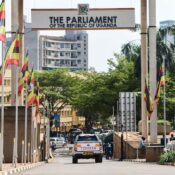
In the midst of tax complaints from diplomats and merchants, Tanzania’s Samia replaces the TRA chief
The abrupt dismissal of Tanzania Revenue Authority (TRA) Commissioner General Alphayo Kidata earlier this week has sparked speculation amid discontent among foreign investors and domestic traders regarding questionable taxation practices.
On Tuesday, President Samia Suluhu Hassan appointed Yusuph Juma Mwenda, the revenue director of Zanzibar, as the new head of the Tanzania Revenue Authority (TRA). Mr. Kidata, who had served in the position since April 2021, was transferred to an unspecified advisory position at State House.
Mr. Kidata was in his second term as the chief taxman, and his most recent transfer occurred as the government prepared to engage in discussions with members of the diplomatic corps to address a variety of complaints they had raised last week regarding the alleged unfair taxation of foreign direct investments (FDIs) in Tanzania.
The timing of the action, which coincided with a second strike within a year by local market traders protesting long-running harassment by TRA officials and agents, was also coincident with the argument that the 60-year-old Kidata (born December 28, 1963) was already past the public service retirement age.
State House Chief Secretary Moses Kusiluka’s announcement in the same July 2 brief of a replacement for Industries and Trade Minister Ashatu Kijaji, who was a member of the government team involved in protracted negotiations with the traders last week, further piqued curiosity.
Dr. Kijaji was appointed Minister of State responsible for Union and environmental affairs in the Vice President’s Office, where he exchanged portfolios with Selemani Jafo. No rationale was provided for any of the new appointments.
Earlier on June 26, Tanzania-based ambassadors and high commissioners from ten countries submitted a formal request to Foreign Affairs Minister January Makamba for a meeting to resolve the “recent and ongoing challenges” encountered by foreign investors in relation to TRA tax administration.
The EastAfrican was able to acquire a copy of the request letter, which was signed by envoys from the United States, Canada, Britain, Ireland, Germany, France, Belgium, the Netherlands, Sweden, and South Korea.
They specifically cited, among other things, “unevidenced” TRA notices demanding payments and account reconciliations dating back up to 15 years, extraordinary tax bills that were not supported by law, and TRA’s rejection of tax concession agreements with the Tanzania Investment Centre (TIC), another state agency, on the basis that they had not been “gazetted.”
“Investors also report that TRA agents threaten investors and Tanzanian partners when companies protest or appeal these practices, and freeze or seize bank accounts and company assets without notification or timely legal recourse,” the envoys’ letter stated.
The trend had “undermined” TIC’s achievement in increasing the value of FDI registrations from $3 million in 2021 to $5.5 million in 2022, according to them. Some investor companies were “now receiving notices with additional demands for tax payment,” despite undergoing regular examinations by TRA and state-endorsed international audit firms.
In one instance, the envoys cited a company that was issued a Tsh1.2 billion ($455,400) tax notice. The notice required the company to pay up “within three working days for discrepancies dating back 12 years, under the threat of having its operational accounts frozen and funds withdrawn.”
Mr. Makamba responded the following day (June 27) through official correspondence, promising to organize a roundtable discussion with the envoys, relevant government officials, and representatives of aggrieved investors to directly address the concerns. However, he did not immediately provide a specific date.
The investors being referred to should prepare a compendium or presentation that details their grievances in order for the meeting to be productive. He further stated that “the sooner this report is presented to us, the sooner we will be able to schedule the requested meeting.”
According to the minister, Tanzania is dedicated to safeguarding and guaranteeing the “ironclad” success of all foreign direct investments (FDIs). The government will “take very seriously any alleged transgression, by any public entity, that endangers the country’s reputation as an investor-friendly destination.”
The long-standing demands for a more transparent tax system in the face of continuous badgering by TRA compliance inspectors were the focal point of the strike by traders in Dar es Salaam and other urban markets last week.
Since the previous strike at the significant Kariakoo market in Dar es Salaam in May of last year, the merchants’ concerns had remained unresolved. In a series of discussions with representatives of merchants in the administrative capital of Dodoma, the government was able to defuse the situation by making tentative promises of prompt resolutions.
In order to more accurately assess the amount of taxes owed by traders at any given moment, TRA was directed to establish a more efficient system that includes the proper documentation of receipts and invoices as part of the solutions package. The system was to be operational by July 1.
Prime Minister Kassim Majaliwa, Finance Minister Mwigulu Nchemba, Minister of State in the President’s Office for Planning and Investment Prof Kitila Mkumbo, and Dr. Kijaji were among the key government officials who participated in the negotiations. The industries and trade docket was still in their possession.
The foreign envoys have requested that the same cabinet ministers, Mr. Makamba, and the TRA commissioner general attend their own impending meeting.
Mr. Kidata has a somewhat erratic history in the civil service, particularly during the tenure of former president John Magufuli, during which he experienced numerous ups and downs and much movement.
From January 2016 to March 2017, he served as the head of the TRA under Magufuli. Subsequently, he was designated permanent secretary of the Ministry of Regional Administration and Local Governments at State House. Subsequently, he was appointed as Tanzania’s envoy to Canada. However, he was unexpectedly recalled in November 2018 and divested of his ambassadorial status, a decision that was never disclosed to the public.
A brief period later, in September 2019, the late president appeared to have another change of heart and appointed Kidata to the relatively subordinate position of Mtwara regional administrative secretary. Samia, who succeeded Magufuli after his death, reinstated him to the TRA pilot position in the early weeks of her presidency while he was serving in that capacity.
Kidata presided over a consistent increase in monthly tax collections during his second tenure at the revenue agency. From August of last year, the collection has not fallen below Tsh2 billion ($784,300), and it reached an all-time peak of Tsh 3.05 billion ($1.19 million) in December 2023.
By the conclusion of the fiscal year 2022/23, annual tax revenues had increased by 30% from Tsh18 trillion ($7.05 million) in 2020/21, the final year of Magufuli’s tenure, to Tsh24 trillion ($9.41 million).
Tanzania’s most recent budget establishes a new collection target of Tsh29.41 trillion ($11.31 billion) for the 2024/25 fiscal year. The nation’s objective is to finance over two-thirds (67.4 percent) of its Tsh49.35 trillion ($18.98 billion) expenditure plan through domestic financing.
All Categories
Recent Posts
Tags
+13162306000
zoneyetu@yahoo.com



